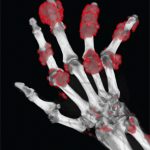The authors also found that, in particular, male patients with hyperuricemia were more likely to have the APOE-ε2ε3 genotype and APOE-ε2 allele than were male controls. This was true for both Han and Hui subjects. Moreover, the levels of TG, LDL-C, and UA were significantly different among the APOE genotype groups ε2ε3, ε3ε3 and ε3ε4 for both normouricemic and hyperuricemic patients.
The authors acknowledge that although the APOE-ε2ε3 genotype and APOE-ε2 allele are associated with serum UA levels, it is still not clear how APOE polymorphism may contribute to UA metabolism. (posted 12/12/14)
ad goes here:advert-1
ADVERTISEMENT
SCROLL TO CONTINUE
Lara C. Pullen, PhD, is a medical writer based in the Chicago area.
Reference
ad goes here:advert-2
ADVERTISEMENT
SCROLL TO CONTINUE

